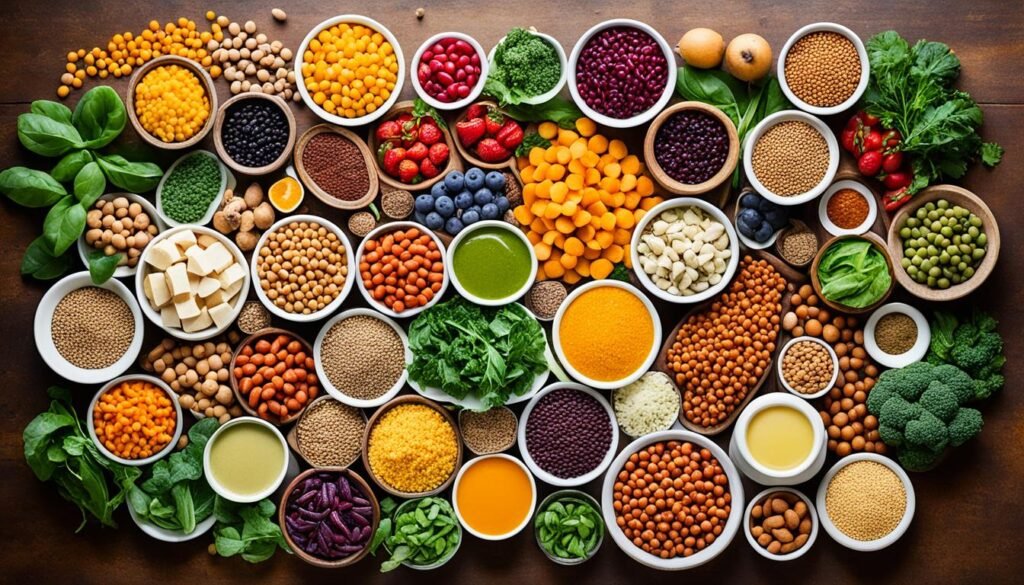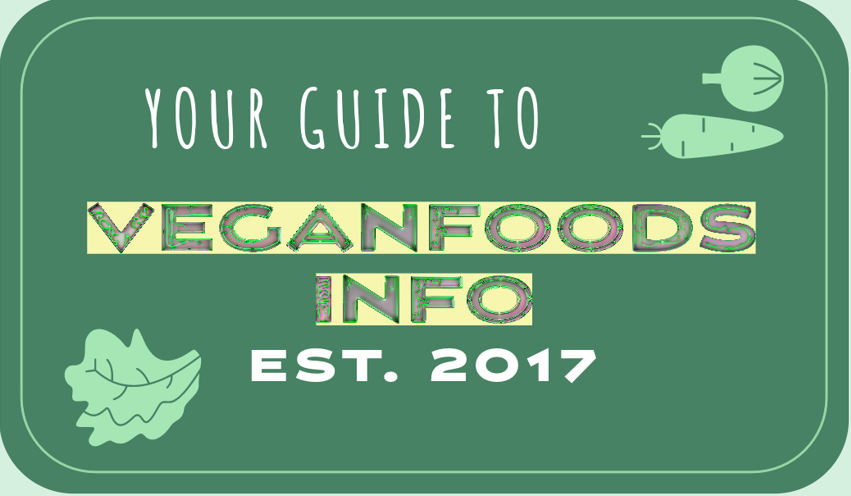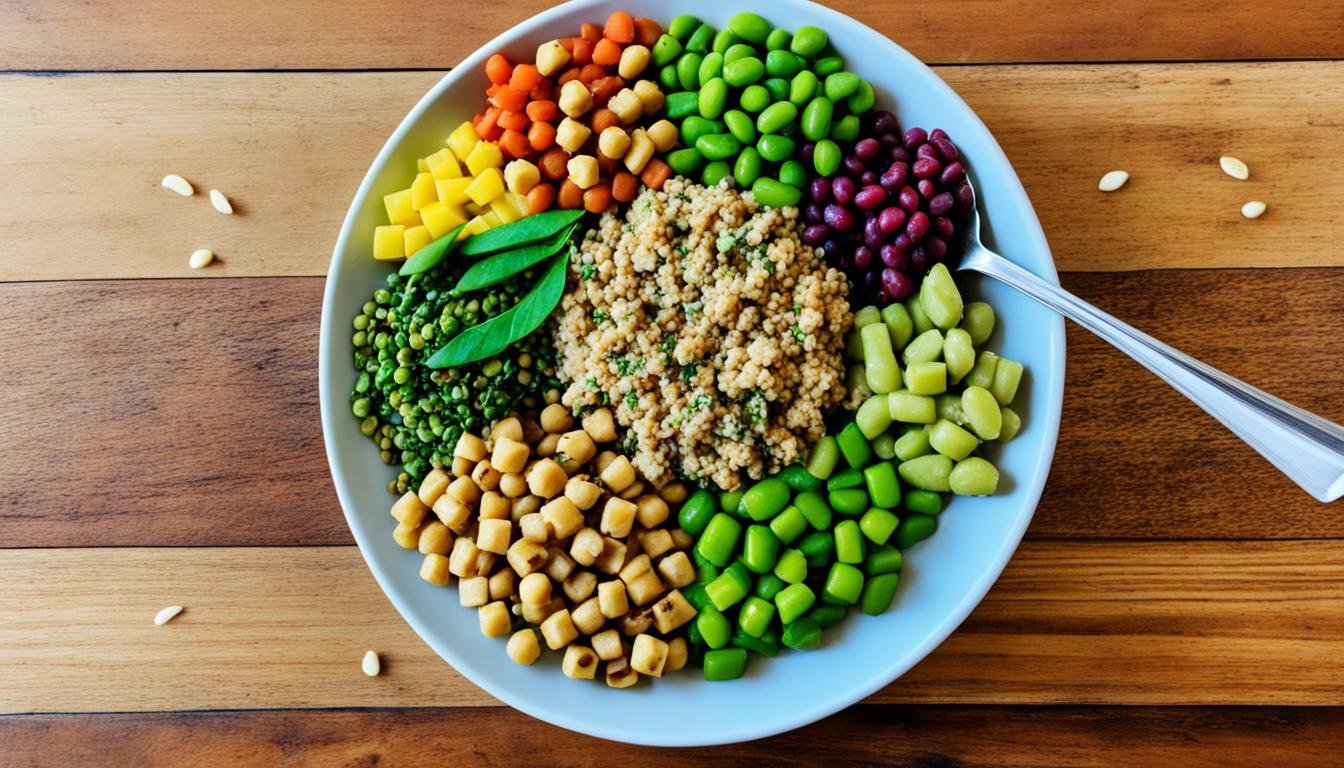Welcome to our guide on the top vegan protein sources for healthy eating! If you follow a plant-based lifestyle or are simply looking to incorporate more plant-based protein into your diet, you’ve come to the right place. Discover a variety of delicious and nutritious options that will help you meet your daily protein needs without relying on animal products.
Plant-based protein is not only beneficial for your health but also for the environment. By choosing vegan protein sources, you’re making a positive impact on both your body and the planet. Whether you’re a long-time vegan or just starting your plant-based journey, we have plenty of options to share with you.
In the following sections, we will explore the benefits of plant-based protein, discuss complete plant protein sources, and provide you with protein-rich vegan foods for every meal. We will also delve into meat-free protein alternatives that can be used as substitutes in your favorite dishes. Get ready to discover an array of delicious and nutritious options that will support your overall well-being!
Benefits of Plant-Based Protein
When it comes to meeting your protein needs on a vegan diet, plant-based protein sources offer a wide range of benefits. From supporting muscle growth and repair to maintaining a healthy weight, incorporating vegan protein options into your meals can have a positive impact on your overall health and well-being.
One of the major advantages of choosing plant protein sources is their ability to contribute to a high protein vegan diet. Contrary to the misconception that plant-based diets lack protein, there are numerous vegan options that provide ample amounts of this essential nutrient.
Plant protein sources offer not only protein but also an array of additional nutrients such as fiber, vitamins, and minerals. This means that incorporating these foods into your diet can help you meet your overall nutritional needs while supporting your fitness goals.
Furthermore, plant-based proteins are often lower in saturated fat and cholesterol compared to animal-based proteins. This makes them heart-healthy options that can help reduce the risk of cardiovascular diseases.
“Plant-based proteins are a fantastic choice for individuals following a vegan or vegetarian lifestyle. Not only do they offer all the essential amino acids, but they also provide necessary dietary fiber and promote a more sustainable and environmentally-friendly approach to nutrition.”
Some popular plant protein sources include legumes, such as lentils and chickpeas, as well as nuts, seeds, and whole grains. These options are not only rich in protein but also versatile enough to be incorporated into a variety of dishes.
To ensure you are getting all the essential amino acids needed for a complete and balanced diet, it’s important to consume a variety of plant protein sources. This way, you can meet your protein needs without relying solely on one type of food.
Next, we will explore specific plant protein sources that stand out for their complete amino acid profiles, helping you make informed choices when it comes to meeting your protein requirements on a vegan diet.
Benefits of Plant-Based Protein
| Benefit | Description |
|---|---|
| Supports muscle growth and repair | Plant-based proteins provide the building blocks necessary for muscle development and recovery after exercise. They are rich in essential amino acids required for muscle synthesis. |
| Aids in maintaining a healthy weight | Vegan protein options tend to be lower in calories and fat, making them a beneficial choice for weight management. They also provide a greater sense of satiety, helping to curb overeating. |
| Heart-healthy | Plant proteins are generally lower in saturated fat and cholesterol compared to animal proteins. Incorporating them into your diet can help reduce the risk of heart diseases and promote overall cardiovascular health. |
| Rich in essential nutrients | Plant protein sources offer a range of vitamins, minerals, and antioxidants that support overall health and well-being. |
| Sustainable and environmentally-friendly | Choosing plant-based protein sources reduces environmental impact, as it requires fewer resources and produces fewer greenhouse gas emissions compared to animal-based options. |
Complete Plant Protein Sources
When it comes to following a vegan lifestyle, ensuring that you consume enough protein is essential for maintaining optimal health and supporting your body’s functions. While there is a common misconception that plant-based diets lack complete protein, there are actually several vegan protein sources that provide all the essential amino acids our bodies need.
Discover the best vegan protein sources that offer complete plant protein, making it easier for you to meet your protein needs while following a vegan lifestyle. These sources not only provide the necessary amino acids but also offer a wide range of other nutrients, making them a valuable addition to your diet.
“By incorporating these complete plant protein sources into your meals, you can enjoy a balanced diet that supports muscle growth, repair, and overall health.”
Plant-Based Sources of Complete Protein
Here are some of the best vegan protein sources that offer complete plant protein:
| Food | Protein Content per Serving |
|---|---|
| Lentils | 18 grams |
| Quinoa | 8 grams |
| Soybeans | 29 grams |
| Chia Seeds | 4 grams |
| Hemp Seeds | 10 grams |
These plant-based protein sources not only contain all the essential amino acids but also provide additional benefits such as fiber, vitamins, and minerals. They can be incorporated into various dishes, from salads to stir-fries, to ensure you get a diverse range of nutrients in your meals.

Now that you know the best vegan protein sources that offer complete plant protein, you can confidently incorporate them into your meals and enjoy a balanced and nutritious vegan diet.
Protein-Rich Vegan Foods for Every Meal
When following a vegan diet, it’s important to ensure you’re getting an adequate amount of protein to support your health and well-being. Fortunately, there are plenty of protein-rich vegan foods that you can incorporate into each of your meals. These plant-based options not only provide the necessary nutrients your body needs, but they also offer a variety of flavors and textures to keep your taste buds satisfied.
Breakfast
Start your day off right with a protein-packed vegan breakfast. Consider incorporating the following options:
- Chickpea flour: Make delicious savory pancakes or an omelet using chickpea flour, which is high in protein and low in fat.
- Tofu scramble: Replace eggs with crumbled tofu seasoned with your favorite herbs and spices for a hearty and nutritious breakfast.
- Chia seeds: Sprinkle chia seeds over your oatmeal or yogurt to increase the protein content and add a dose of healthy omega-3 fatty acids.
Lunch
For a filling and protein-rich vegan lunch, try these options:
- Lentils: Incorporate lentils into your salads, soups, or stews as they provide a good amount of protein, fiber, and essential minerals.
- Quinoa: Use quinoa as a base for grain bowls or as a side dish. It’s a complete protein source and also contains fiber and beneficial antioxidants.
- Tempeh: Grill or sauté tempeh and add it to your sandwiches, wraps, or stir-fries for a meaty texture and a substantial protein boost.
Dinner
For a satisfying and protein-rich vegan dinner, consider these options:
- Beans: Add beans such as black beans, kidney beans, or chickpeas to your chili, tacos, or salads to increase the protein content and create a hearty meal.
- Soy curls: Made from whole soybeans, soy curls are a versatile meat substitute that can be used in various dishes, from stir-fries to curries.
- Seitan: Known as “wheat meat,” seitan is an excellent source of protein and can be used as a meat alternative in dishes like burgers, kebabs, or stir-fries.
Remember, incorporating a variety of protein-rich vegan foods into your meals ensures that you’re getting a complete range of amino acids and essential nutrients. Below is a table summarizing the protein content of some common vegan protein sources:
| Food | Protein Content per 100g |
|---|---|
| Chickpeas | 19g |
| Lentils | 9g |
| Quinoa | 4g |
| Tofu | 8g |
| Seitan | 25g |
With these protein-rich vegan options, you can enjoy a balanced and nutritious diet while following a plant-based lifestyle. Experiment with different recipes and combinations to discover your favorite protein sources and create delicious meals that support your overall health and well-being.
Meat-Free Protein Alternatives
Looking for meat-free protein alternatives? You’re in the right place. Transitioning to a more plant-based diet doesn’t mean giving up the taste and texture you love. There are plenty of plant-based options that can serve as excellent substitutes in your favorite meat-based dishes.
One popular meat-free protein alternative is tempeh. Made from fermented soybeans, tempeh has a firm texture and a nutty flavor that makes it a great replacement for meat in stir-fries, sandwiches, and even burgers.
Another fantastic option is seitan. Also known as wheat meat, seitan has a chewy texture that resembles meat. It absorbs flavors well, making it ideal for marinating, grilling, and even sautéing. You can use seitan as a substitute for beef, pork, or chicken in various recipes, adding a protein punch to your meatless meals.
One more meat-free protein alternative worth mentioning is jackfruit. Known for its ability to mimic pulled pork, jackfruit is a versatile fruit that can be shredded and seasoned to create a delicious plant-based alternative. Whether you’re making tacos, sandwiches, or BBQ-style dishes, jackfruit is a game-changer.

